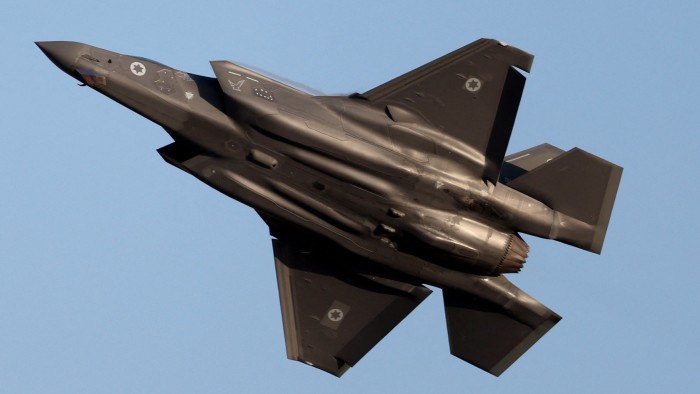Unlock the Editor’s Digest for free
Roula Khalaf, Editor of the FT, selects her favourite stories in this weekly newsletter.
The UK High Court has ruled that the government’s decision to keep making available F-35 fighter jet parts to Israel through a global pool of components is legal, despite a wider ban on arms sales to the country following the Netanyahu government’s actions in Gaza.
Campaigners at Palestinian human rights organisation Al-Haq had taken legal action against the Department for Business and Trade over the UK’s supply of critical parts for the combat aircraft.
The UK does not sell F-35 components directly to Israel, but has continued to supply them to a global pool of parts that Israel has access to. The UK has cited national security needs and that of its allies in the F-35 programme — which was challenged in court on the grounds they may be used to breach international humanitarian law.
The court on Monday ruled that the “acutely sensitive and political issue” was “a matter for the executive which is democratically accountable to parliament and ultimately to the electorate, not for the courts”.
Last September Sir Keir Starmer’s government suspended some export licences to Israel for arms used in military operations in Gaza, after a British government review found possible breaches of international humanitarian law by Israel. However, the decision included a dedicated carve-out for the F-35 programme.
“We reject all of the Claimant’s extant grounds of challenge to the September Decision,” the ruling from Lord Justice Males and Mrs Justice Steyn added.
The ruling means that sales of the components from the UK to the global pool of parts for the Lockheed Martin F-35 Lightning II fighter jet will continue. The UK is one of eight partner nations participating in the F-35 programme, including the US, Israel, Italy, Canada, Norway, Denmark and the Netherlands.
The government has argued that cutting off UK-manufactured components to the global pool will endanger international security by harming the maintenance and operations of F-35s in other nations.
The judicial challenge by Al-Haq had been supported by Oxfam, Amnesty International and Human Rights Watch, which were interveners in the case and argued that the government had a duty to “respect and ensure respect” for the Geneva Conventions, which protect civilians in war zones, “in all circumstances”.
The claimants — whose legal team includes Phillippa Kaufmann KC and Raza Husain KC — also argued the UK’s duty to prevent genocide relates to whether there is a “serious risk” of it taking place, not necessarily whether it has already been committed.
“The fact that those parts are now being transferred indirectly to Israel via the United States of America, rather than provided directly to Israel, does not minimise the severity of their impact on the ground in Gaza,” they argued.
The UK government’s legal team, led by Sir James Eadie KC, who represents the government in important cases, contended that its decision not to suspend all arms export licences was lawful and justified.
The government’s lawyers said that suspending F-35 components would have a negative impact on international security, including for Nato, highlighting the “gravity of the risks to the F-35 programme, and to international peace and security if the F-35 programme were to be compromised” by stopping the exports.
An obligation to prevent grave breaches of international humanitarian law relates to “actual knowledge” that such a breach would take place, they added.



